Deck 19: Behavioral Chains
Question
Question
Question
Question
Question
Question
Question
Question
Question
Question
Question
Question
Question
Question
Question
Question
Question
Question
Question
Question
Question
Question
Question
Question
Question
Question
Question
Question
Question
Question
Question
Question
Question
Question
Question
Question
Question
Question
Question
Question
Question

Unlock Deck
Sign up to unlock the cards in this deck!
Unlock Deck
Unlock Deck
1/41
Play
Full screen (f)
Deck 19: Behavioral Chains
1
What technical terminology best describes the role of the light in the following case? Rudolph the rat pulls a chain that turns on a light, which reinforces pulling the chain. In the presence of the light, the rat's lever press will produce a drop of water.
A) backward chaining
B) forward chaining
C) total-task presentation
D) dual-functioning chained stimulus
E) differential reinforcement of low rate
F) the first link last method
A) backward chaining
B) forward chaining
C) total-task presentation
D) dual-functioning chained stimulus
E) differential reinforcement of low rate
F) the first link last method
D
2
If we were to train someone first to put a quarter in the vending machine (1st link), then to press the button of the drink they want (2nd link), then to approach the dispensed drink (3rd link), what would this entire training procedure be?
A) backward chaining
B) forward chaining
C) total-task presentation
D) dual-functioning chained stimulus
E) differential reinforcement of low rate
F) the first link last method
A) backward chaining
B) forward chaining
C) total-task presentation
D) dual-functioning chained stimulus
E) differential reinforcement of low rate
F) the first link last method
D
3
Which link would we train first, if we're doing forward chaining?
A) Rat pulls chain Light on
B) Light on Rat presses lever Dipper click
C) Dipper click Rat approaches dipper Rat receives water
A) Rat pulls chain Light on
B) Light on Rat presses lever Dipper click
C) Dipper click Rat approaches dipper Rat receives water
Rat pulls chain Light on
4
Which link would we train first, if we're doing backward chaining?
A) Rat pulls chain Light on
B) Light on Rat presses lever Dipper click
C) Dipper click Rat approaches dipper Rat receives water
A) Rat pulls chain Light on
B) Light on Rat presses lever Dipper click
C) Dipper click Rat approaches dipper Rat receives water

Unlock Deck
Unlock for access to all 41 flashcards in this deck.
Unlock Deck
k this deck
5
Please match the following definitions with the terms below. (Not all of the terms will be used)
-A sequence of stimuli and responses. Each response produces a stimulus that reinforces the preceding response and is an SD or operandum for the following response.
A) Forward chaining
B) The antecedent/consequent method
C) The simultaneity method
D) Dual-functioning chained stimuli
E) Behavioral chain
F) Successive linking
G) Total-task presentation
H) Backward chaining
I) Final linking
J) Hyper stimuli
-A sequence of stimuli and responses. Each response produces a stimulus that reinforces the preceding response and is an SD or operandum for the following response.
A) Forward chaining
B) The antecedent/consequent method
C) The simultaneity method
D) Dual-functioning chained stimuli
E) Behavioral chain
F) Successive linking
G) Total-task presentation
H) Backward chaining
I) Final linking
J) Hyper stimuli

Unlock Deck
Unlock for access to all 41 flashcards in this deck.
Unlock Deck
k this deck
6
Please match the following definitions with the terms below. (Not all of the terms will be used)
-A stimulus in a behavioral chain reinforces the response that precedes it and is an SD or operandum for the following response.
A) Forward chaining
B) The antecedent/consequent method
C) The simultaneity method
D) Dual-functioning chained stimuli
E) Behavioral chain
F) Successive linking
G) Total-task presentation
H) Backward chaining
I) Final linking
J) Hyper stimuli
-A stimulus in a behavioral chain reinforces the response that precedes it and is an SD or operandum for the following response.
A) Forward chaining
B) The antecedent/consequent method
C) The simultaneity method
D) Dual-functioning chained stimuli
E) Behavioral chain
F) Successive linking
G) Total-task presentation
H) Backward chaining
I) Final linking
J) Hyper stimuli

Unlock Deck
Unlock for access to all 41 flashcards in this deck.
Unlock Deck
k this deck
7
Please match the following definitions with the terms below. (Not all of the terms will be used)
-The establishment of the first link in a behavioral chain, with the addition of successive links, until the final link is acquired.
A) Forward chaining
B) The antecedent/consequent method
C) The simultaneity method
D) Dual-functioning chained stimuli
E) Behavioral chain
F) Successive linking
G) Total-task presentation
H) Backward chaining
I) Final linking
J) Hyper stimuli
-The establishment of the first link in a behavioral chain, with the addition of successive links, until the final link is acquired.
A) Forward chaining
B) The antecedent/consequent method
C) The simultaneity method
D) Dual-functioning chained stimuli
E) Behavioral chain
F) Successive linking
G) Total-task presentation
H) Backward chaining
I) Final linking
J) Hyper stimuli

Unlock Deck
Unlock for access to all 41 flashcards in this deck.
Unlock Deck
k this deck
8
Please match the following definitions with the terms below. (Not all of the terms will be used)
-The simultaneous training of all links in a behavioral chain.
A) Forward chaining
B) The antecedent/consequent method
C) The simultaneity method
D) Dual-functioning chained stimuli
E) Behavioral chain
F) Successive linking
G) Total-task presentation
H) Backward chaining
I) Final linking
J) Hyper stimuli
-The simultaneous training of all links in a behavioral chain.
A) Forward chaining
B) The antecedent/consequent method
C) The simultaneity method
D) Dual-functioning chained stimuli
E) Behavioral chain
F) Successive linking
G) Total-task presentation
H) Backward chaining
I) Final linking
J) Hyper stimuli

Unlock Deck
Unlock for access to all 41 flashcards in this deck.
Unlock Deck
k this deck
9
Please match the following definitions with the terms below. (Not all of the terms will be used)
-The establishment of the final link in a behavioral chain, with the addition of preceding links until the first link is acquired.
A) Forward chaining
B) The antecedent/consequent method
C) The simultaneity method
D) Dual-functioning chained stimuli
E) Behavioral chain
F) Successive linking
G) Total-task presentation
H) Backward chaining
I) Final linking
J) Hyper stimuli
-The establishment of the final link in a behavioral chain, with the addition of preceding links until the first link is acquired.
A) Forward chaining
B) The antecedent/consequent method
C) The simultaneity method
D) Dual-functioning chained stimuli
E) Behavioral chain
F) Successive linking
G) Total-task presentation
H) Backward chaining
I) Final linking
J) Hyper stimuli

Unlock Deck
Unlock for access to all 41 flashcards in this deck.
Unlock Deck
k this deck
10
Please match the following definitions with the terms below. (Not all of the terms will be used)
-This is just a silly term you included to fool us (you may need to use this more than once).
A) Forward chaining
B) The antecedent/consequent method
C) The simultaneity method
D) Dual-functioning chained stimuli
E) Behavioral chain
F) Successive linking
G) Total-task presentation
H) Backward chaining
I) Final linking
J) Hyper stimuli
-This is just a silly term you included to fool us (you may need to use this more than once).
A) Forward chaining
B) The antecedent/consequent method
C) The simultaneity method
D) Dual-functioning chained stimuli
E) Behavioral chain
F) Successive linking
G) Total-task presentation
H) Backward chaining
I) Final linking
J) Hyper stimuli

Unlock Deck
Unlock for access to all 41 flashcards in this deck.
Unlock Deck
k this deck
11
Fill in the Blank
-Behavioral chain
• A ________________________ of stimuli and responses.
• Each ________________________produces a stimulus that
• ________________________the preceding response
• and is an ________________________or operandum
• for the following ________________________.
-Behavioral chain
• A ________________________ of stimuli and responses.
• Each ________________________produces a stimulus that
• ________________________the preceding response
• and is an ________________________or operandum
• for the following ________________________.

Unlock Deck
Unlock for access to all 41 flashcards in this deck.
Unlock Deck
k this deck
12
Fill in the Blank
-Dual-functioning chained stimuli
A stimulus in a behavioral ________________________
_______________________the response that precedes it
and is an ________________________or operandum for the following response.
-Dual-functioning chained stimuli
A stimulus in a behavioral ________________________
_______________________the response that precedes it
and is an ________________________or operandum for the following response.

Unlock Deck
Unlock for access to all 41 flashcards in this deck.
Unlock Deck
k this deck
13
Fill in the Blank
-Forward chaining
The establishment of the ________________________link in a behavioral chain,
with the addition of ________________________links,
until the ________________________link is acquired.
-Forward chaining
The establishment of the ________________________link in a behavioral chain,
with the addition of ________________________links,
until the ________________________link is acquired.

Unlock Deck
Unlock for access to all 41 flashcards in this deck.
Unlock Deck
k this deck
14
Fill in the Blank
-Total-task presentation
The ________________________training of
all links in a behavioral ________________________.
-Total-task presentation
The ________________________training of
all links in a behavioral ________________________.

Unlock Deck
Unlock for access to all 41 flashcards in this deck.
Unlock Deck
k this deck
15
Fill in the Blank
-Backward chaining
The establishment of the ________________________link in a behavioral chain,
with the addition of ________________________links
until the ________________________link is acquired.
-Backward chaining
The establishment of the ________________________link in a behavioral chain,
with the addition of ________________________links
until the ________________________link is acquired.

Unlock Deck
Unlock for access to all 41 flashcards in this deck.
Unlock Deck
k this deck
16
Define the following terms:
-Forward chaining
-Forward chaining

Unlock Deck
Unlock for access to all 41 flashcards in this deck.
Unlock Deck
k this deck
17
Define the following terms:
-Dual-functioning chained stimuli
-Dual-functioning chained stimuli

Unlock Deck
Unlock for access to all 41 flashcards in this deck.
Unlock Deck
k this deck
18
Define the following terms:
-Behavioral chain
-Behavioral chain

Unlock Deck
Unlock for access to all 41 flashcards in this deck.
Unlock Deck
k this deck
19
Define the following terms:
-Total-task presentation
-Total-task presentation

Unlock Deck
Unlock for access to all 41 flashcards in this deck.
Unlock Deck
k this deck
20
Define the following terms:
-Backwards chaining
-Backwards chaining

Unlock Deck
Unlock for access to all 41 flashcards in this deck.
Unlock Deck
k this deck
21
Give an example of each of the following concepts (including a few links):
-Forward chaining
-Forward chaining

Unlock Deck
Unlock for access to all 41 flashcards in this deck.
Unlock Deck
k this deck
22
Give an example of each of the following concepts (including a few links):
-Dual-functioning chained stimuli
-Dual-functioning chained stimuli

Unlock Deck
Unlock for access to all 41 flashcards in this deck.
Unlock Deck
k this deck
23
Give an example of each of the following concepts (including a few links):
-Behavioral chain
-Behavioral chain

Unlock Deck
Unlock for access to all 41 flashcards in this deck.
Unlock Deck
k this deck
24
Give an example of each of the following concepts (including a few links):
-Total-task presentation
-Total-task presentation

Unlock Deck
Unlock for access to all 41 flashcards in this deck.
Unlock Deck
k this deck
25
Give an example of each of the following concepts (including a few links):
-Backwards chaining
-Backwards chaining

Unlock Deck
Unlock for access to all 41 flashcards in this deck.
Unlock Deck
k this deck
26
For each of the following questions, provide an example from the book or from your own life.
-Total-task presentation-give an example. Describe:
the response classes
the reinforcement contingencies
the presumed reinforcers
the results
any other interesting features of the intervention.
-Total-task presentation-give an example. Describe:
the response classes
the reinforcement contingencies
the presumed reinforcers
the results
any other interesting features of the intervention.

Unlock Deck
Unlock for access to all 41 flashcards in this deck.
Unlock Deck
k this deck
27
For each of the following questions, provide an example from the book or from your own life.
-Backward chaining-give an example. Describe:
the response classes
the reinforcement contingencies
the presumed reinforcers
the results
any other interesting features of the intervention.
-Backward chaining-give an example. Describe:
the response classes
the reinforcement contingencies
the presumed reinforcers
the results
any other interesting features of the intervention.

Unlock Deck
Unlock for access to all 41 flashcards in this deck.
Unlock Deck
k this deck
28
For each of the following questions, provide an example from the book or from your own life.
-Diagram dual-functioning chained stimuli in the Skinner box.
-Diagram dual-functioning chained stimuli in the Skinner box.

Unlock Deck
Unlock for access to all 41 flashcards in this deck.
Unlock Deck
k this deck
29
For each of the following questions, provide an example from the book or from your own life.
-Give an example of a non-chained behavioral sequence.
-Give an example of a non-chained behavioral sequence.

Unlock Deck
Unlock for access to all 41 flashcards in this deck.
Unlock Deck
k this deck
30
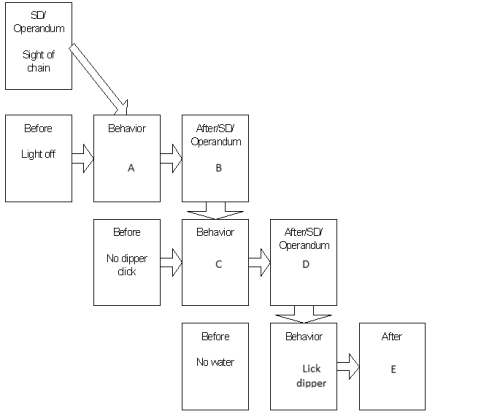 Match the letters in the boxes to the words that go in those boxes in order to complete the behavior chain of Rudolph the Rat in a Skinner Box.
Match the letters in the boxes to the words that go in those boxes in order to complete the behavior chain of Rudolph the Rat in a Skinner Box.-Pull chain
A) A
B) B
C) C
D) D
E) E

Unlock Deck
Unlock for access to all 41 flashcards in this deck.
Unlock Deck
k this deck
31
 Match the letters in the boxes to the words that go in those boxes in order to complete the behavior chain of Rudolph the Rat in a Skinner Box.
Match the letters in the boxes to the words that go in those boxes in order to complete the behavior chain of Rudolph the Rat in a Skinner Box.-Light
A) A
B) B
C) C
D) D
E) E

Unlock Deck
Unlock for access to all 41 flashcards in this deck.
Unlock Deck
k this deck
32
 Match the letters in the boxes to the words that go in those boxes in order to complete the behavior chain of Rudolph the Rat in a Skinner Box.
Match the letters in the boxes to the words that go in those boxes in order to complete the behavior chain of Rudolph the Rat in a Skinner Box.-Press lever
A) A
B) B
C) C
D) D
E) E

Unlock Deck
Unlock for access to all 41 flashcards in this deck.
Unlock Deck
k this deck
33
 Match the letters in the boxes to the words that go in those boxes in order to complete the behavior chain of Rudolph the Rat in a Skinner Box.
Match the letters in the boxes to the words that go in those boxes in order to complete the behavior chain of Rudolph the Rat in a Skinner Box.-After: SD/Operandum
A) A
B) B
C) C
D) D
E) E

Unlock Deck
Unlock for access to all 41 flashcards in this deck.
Unlock Deck
k this deck
34
 Match the letters in the boxes to the words that go in those boxes in order to complete the behavior chain of Rudolph the Rat in a Skinner Box.
Match the letters in the boxes to the words that go in those boxes in order to complete the behavior chain of Rudolph the Rat in a Skinner Box.-Water
A) A
B) B
C) C
D) D
E) E

Unlock Deck
Unlock for access to all 41 flashcards in this deck.
Unlock Deck
k this deck
35
Match the numbers in the boxes to the words that go in those boxes in order to complete the behavior chain in teaching a child with cerebral palsy to walk
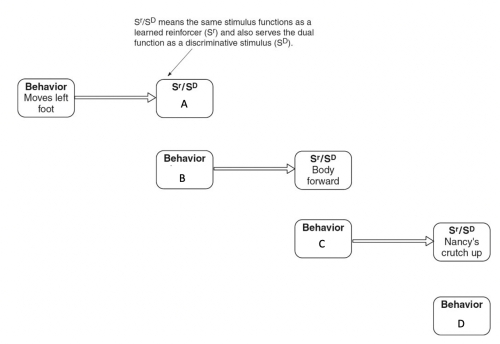
-Moves crutch
A) A
B) B
C) C
D) D

-Moves crutch
A) A
B) B
C) C
D) D

Unlock Deck
Unlock for access to all 41 flashcards in this deck.
Unlock Deck
k this deck
36
Match the numbers in the boxes to the words that go in those boxes in order to complete the behavior chain in teaching a child with cerebral palsy to walk

-Leans forward
A) A
B) B
C) C
D) D

-Leans forward
A) A
B) B
C) C
D) D

Unlock Deck
Unlock for access to all 41 flashcards in this deck.
Unlock Deck
k this deck
37
Match the numbers in the boxes to the words that go in those boxes in order to complete the behavior chain in teaching a child with cerebral palsy to walk

-Moves foot
A) A
B) B
C) C
D) D

-Moves foot
A) A
B) B
C) C
D) D

Unlock Deck
Unlock for access to all 41 flashcards in this deck.
Unlock Deck
k this deck
38
Match the numbers in the boxes to the words that go in those boxes in order to complete the behavior chain in teaching a child with cerebral palsy to walk

-Raise crutch
A) A
B) B
C) C
D) D

-Raise crutch
A) A
B) B
C) C
D) D

Unlock Deck
Unlock for access to all 41 flashcards in this deck.
Unlock Deck
k this deck
39
Fill in the empty boxes for
-Please complete the behavioral chain of Rudolph the Rat in a Skinner box.
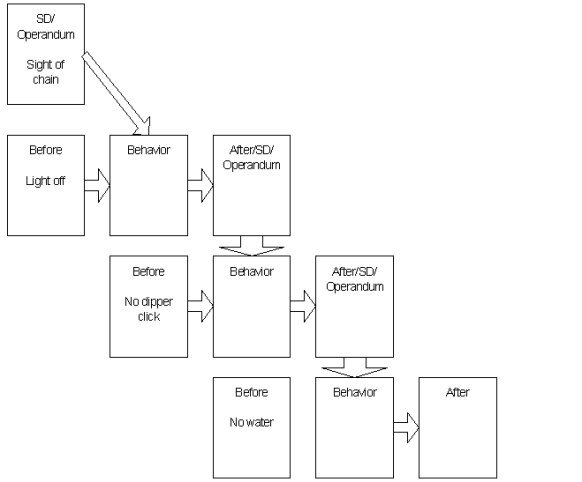
-Please complete the behavioral chain of Rudolph the Rat in a Skinner box.


Unlock Deck
Unlock for access to all 41 flashcards in this deck.
Unlock Deck
k this deck
40
Fill in the empty boxes for
-Diagram a behavioral intervention to teach a child with cerebral palsy to walk
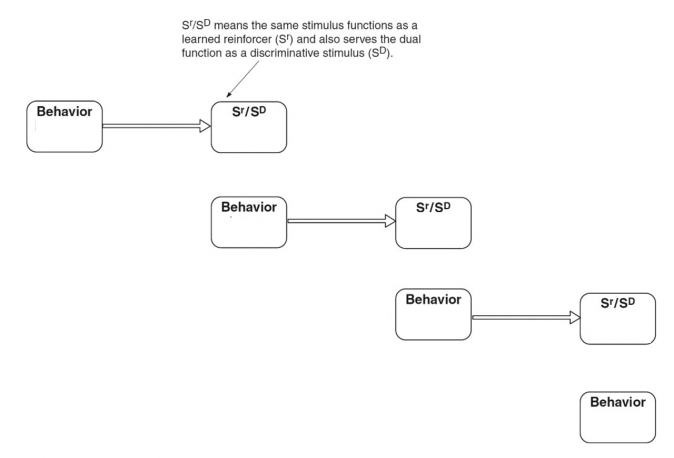
-Diagram a behavioral intervention to teach a child with cerebral palsy to walk


Unlock Deck
Unlock for access to all 41 flashcards in this deck.
Unlock Deck
k this deck
41
Fill in the empty boxes for
-Diagram a dining-table example of a behavioral chain.
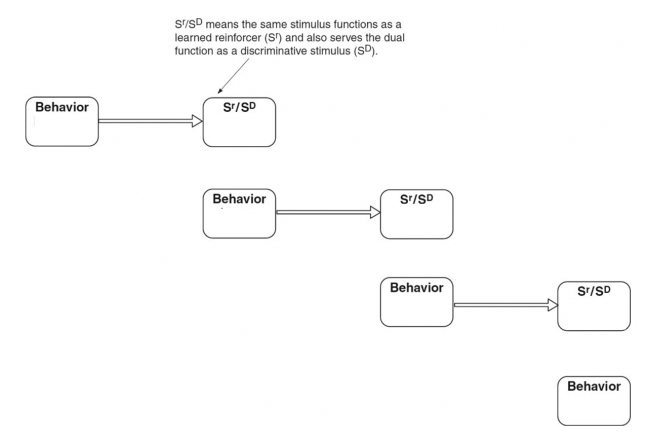
-Diagram a dining-table example of a behavioral chain.


Unlock Deck
Unlock for access to all 41 flashcards in this deck.
Unlock Deck
k this deck


